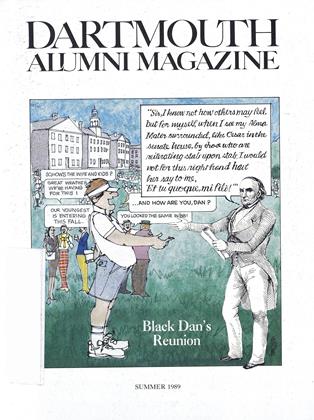(And One Thing You'll Never Forget)
1 For a short time at the start of the controversy, John Wheelock, president of the university, believed he had secured Daniel Webster's services by sending him a $20 retainer. Webster, a staunch Federalist, had no intenrion of representing the Republican-supported state university, told Whedock he would not take the case, and kept the retainer without ever mentioning having received it.
newspaper accounts of the argument have been discovered, all of them containing brief or vague descriptions of Webster's address. (Webster himself had never written them down; his main argument had been constructed while traveling on business between Boston and Barnstable and back.) The words that have become synonomous with Daniel Webster and the Dartmouth College Case weren't made public until 1852, 34 years after they were spoken and one month after the death of the man who had spoken them, by a Yale professor of rhetoric named Chauncey Goodrich. Goodrich, who was present during the oration, wrote out the entire scene verbatim in a letter to Rufus Choate, who was then preparing the official Dartmouth eulogy for Webster. Here is his description (One More Time):
2 Part of Webster's fee for representing the College was financed by a loan from Kimball Union Academy in Meriden, New Hampshire. According to the only known surviving reco is, Dartmouth has repaid just $200 of the original $1,400 loan. (Wehster, by the way, agreed to represent the College but was not moved to contribute when a plea for help went out to all alumni earlier that year.) 3 After the New Hampshire Supreme "This, Sir, is my case. It is the case not merely of that humble institution; it is the case of every college in our land... It is more. It is, in some sense, the case of every man who has property of which he may be stripped, for the question is simply this: Shall our state legislatures be allowed to take that which is not their own, to turn it from its original use, and apply it to such ends or purposes as they, in their discretion, shall see fit?
Court ruled in favor of the university in November, 1817, the case was taken to the U.S. Supreme Court. The hearing in Washington occupied MarcH 10, 11, and 12, 1818. The justices, being of different opinions after the final day, were forced to delay their judgement until the opening sessicn the following year. Chief Justice Marshall ruled in favor of the College in February, 1819.
A The audience for Webster's stirring oration was small and limited primarily to legal men. Only four "Sir, you may destroy this little Institution; it is weak; it is in your hands! I know it is one of the lesser lights in
the literary horizon of our country. You may put it out. But if you do so, you must carry through our work! You must extinguish, one after the other, all those great lights of science which, for more than a century, have thrown their radiance on our land!
"It is, Sir, as I have said, a small College. And yet, there are those "who loveit " Here the feelings which he had thus far succeeded in keeping down, broke forth. His lips quavered; his firm cheeks trembled with emotion; his eyes were filled with tears, his voice choked, and he seemed struggling to the utmost simply to gain that mastery over himself which might save him from an unmanly burst of feeling. [At this moment, Goodrich turned to the justices: Marshall bent forward, straining to catch every word, Story, motionless with pen in hand as if to take notes which he never took, the others seemingly exhausted and transfixed.] When he had recovered his compo- sure, he fixed his keen eye on Marshall, and continued.
"Sir, I know not how others may feel," (glancing at the opponents of the college before him), "but for myself, when I see my alma mater surrounded, like Caesar in the senate house, by those who are reiterating stab upon stab, I would not, for this right hand, have her turn to me and say at tu qiioqve mi ftli! And thou too, my son!"
 View Full Issue
View Full Issue
More From This Issue
-
 Cover Story
Cover StoryBlack Dan's Reunion
June 1989 By Jim Collins '84 -
 Feature
FeatureHenderson the Beach
June 1989 By Rob Eshman '82 -
 Feature
FeatureCommencement '89
June 1989 -
 Feature
FeatureWebster's Greatest Monument
June 1989 By Ed -
 Feature
FeatureHow I Invented Dog Running
June 1989 By John F. Anderson '34 -
 Cover Story
Cover StoryHIS HAT
June 1989







